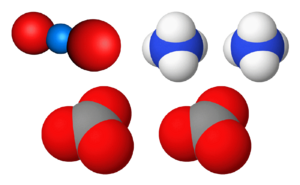Chemistry:Ammonium uranyl carbonate

| |
| Names | |
|---|---|
| IUPAC name
uranium(VI)dioxide tetra-ammonium tricarbonate
| |
| Other names
uranyl ammonium carbonate
AUC | |
| Identifiers | |
3D model (JSmol)
|
|
| ChemSpider | |
PubChem CID
|
|
| UNII | |
| |
| |
| Properties | |
| UO2CO3·2(NH4)2CO3 | |
| Molar mass | 522.199 g/mol |
| Appearance | lemon-yellow crystalline[1] |
| Density | 2.72[1] |
| Melting point | Decomposes between 165 °C and 185 °C |
| Insoluble | |
| Structure[1] | |
| monoclinic | |
| C2/c | |
a = 10·68, b = 9·38, c = 12·85 α = 90°, β = 96.45°°, γ = 90°
| |
Lattice volume (V)
|
1279 |
Formula units (Z)
|
4 |
Except where otherwise noted, data are given for materials in their standard state (at 25 °C [77 °F], 100 kPa). | |
| Infobox references | |
Ammonium uranyl carbonate (UO2CO3·2(NH4)2CO3) is known in the uranium processing industry as AUC[2] and is also called uranyl ammonium carbonate. This compound is important as a component in the conversion process of uranium hexafluoride (UF6) to uranium dioxide (UO2).[3] The ammonium uranyl carbonate is combined with steam and hydrogen at 500–600 °C to yield UO2. In another process aqueous uranyl nitrate, known as uranyl nitrate liquor (UNL) is treated with ammonium bicarbonate to form ammonium uranyl carbonate as a solid precipitate.[4] This is separated from the solution, dried with methanol and then calcinated with hydrogen directly to UO2 to obtain a sinterable grade powder. The ex-AUC uranium dioxide powder is free-flowing, relatively coarse (10 µ) and porous with specific surface area in the range of 5 m2/g and suitable for direct pelletisation, avoiding the granulation step. Conversion to UO2 is often performed as the first stage of nuclear fuel fabrication.[5]
The AUC process is followed in South Korea[6] and Argentina.[7] In the AUC route, calcination, reduction and stabilization are simultaneously carried out in a vertical fluidized bed reactor. In most countries, sinterable grade UO2 powder for nuclear fuel is obtained by the ammonium diuranate (ADU) process, which requires several more steps.
Ammonium uranyl carbonate is also one of the many forms called yellowcake; in this case it is the product obtained by the heap leach process.
References
- ↑ 1.0 1.1 1.2 Graziani, R.; Bombieri, G.; Forsellini, E. (1972). "Crystal structure of tetra-ammonium uranyl tricarbonate". Journal of the Chemical Society, Dalton Transactions (19): 2059. doi:10.1039/DT9720002059.
- ↑ Mellah, A.; Chegrouche, S.; Barkat, M. (2007-03-01). "The precipitation of ammonium uranyl carbonate (AUC): Thermodynamic and kinetic investigations" (in en). Hydrometallurgy 85 (2–4): 163–171. doi:10.1016/j.hydromet.2006.08.011. ISSN 0304-386X. Bibcode: 2007HydMe..85..163M.
- ↑ Krishnan, V. N.; Visweswaraih, M. S.; Shringarpure, P. D.; Koppiker, K. S.; Date, V. G. (in English). Studies on the preparation and characterisation of ammonium uranyl carbonate (AUC). http://inis.iaea.org/Search/search.aspx?orig_q=RN:24000267.
- ↑ Johnson, Timothy J.; Sweet, Lucas E.; Meier, David E.; Mausolf, Edward J.; Kim, Eunja; Weck, Philippe F.; Buck, Edgar C.; McNamara, Bruce K. (2015-05-22). Fountain, Augustus W. ed. "Dehydration of uranyl nitrate hexahydrate to uranyl nitrate trihydrate under ambient conditions as observed via dynamic infrared reflectance spectroscopy". Chemical, Biological, Radiological, Nuclear, and Explosives (CBRNE) Sensing XVI 9455: 945504. doi:10.1117/12.2179704.
- ↑ Glazoff, Michael; J. van Rooen, Isabella; D. Coryell, Benjamin; J. Parga, Clemente (2016-05-05). Comparison of Nuclear Fuels for TREAT: UO2 vs. U3O8. https://www.researchgate.net/publication/305398098.
- ↑ Tae-Joon, Kim; Kyung-Chai, Jeong; Jin-Ho, Park; In-Soon, Chang; Cheong-Song, Choi (1994-05-01). "Crystallization characteristics of ammonium uranyl carbonate (AUC) in ammonium carbonate solutions" (in en). Journal of Nuclear Materials 209 (3): 306–314. doi:10.1016/0022-3115(94)90268-2. ISSN 0022-3115. Bibcode: 1994JNuM..209..306T.
- ↑ Dominguez, C. A.; Leyva, A. G.; Marajofsky, A. (in Spanish). Conditions study of ammonium uranyl tricarbonate precipitation through ammonium carbonate. http://inis.iaea.org/Search/search.aspx?orig_q=RN:24046621.
Extra reading
- Yi-Ming, Pan; Che-Bao, Ma; Nien-Nan, Hsu (September 1981). "The conversion of UO2 via ammonium uranyl carbonate: Study of precipitation, chemical variation and powder properties". Journal of Nuclear Materials 99 (2–3): 135–147. doi:10.1016/0022-3115(81)90182-3. Bibcode: 1981JNuM...99..135Y.
- Kan-Sen, Chou; Ding-Yi, Lin; Mu-Chang, Shieh (May 1989). "Precipitation studies of ammonium uranyl carbonate from UO2F2 solutions". Journal of Nuclear Materials 165 (2): 171–178. doi:10.1016/0022-3115(89)90246-8. Bibcode: 1989JNuM..165..171K.
- Mellah, A.; Chegrouche, S.; Barkat, M. (March 2007). "The precipitation of ammonium uranyl carbonate (AUC): Thermodynamic and kinetic investigations". Hydrometallurgy 85 (2–4): 163–171. doi:10.1016/j.hydromet.2006.08.011. Bibcode: 2007HydMe..85..163M.
 |

